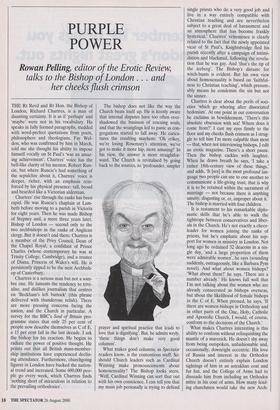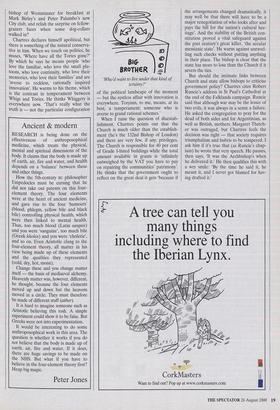PURPLE POWER
Rowan Pelling, editor of the Erotic Review,
talks to the Bishop of London . . . and her cheeks flush crimson
THE Rt Revd and Rt Hon. the Bishop of London, Richard Chartres, is a man of daunting certainty. It is as if 'perhaps' and `maybe' were not in his vocabulary. He speaks in fully formed paragraphs, studded with word-perfect quotations from poets, philosophers and theologians. Fay Wel- don, who was confirmed by him in March, told me she thought his ability to impose himself vocally on St Paul's 'was an amaz- ing achievement'. Chartres' voice has the bell-like clarity of his mentor, Robert Run- cie, but where Runcie's had something of the sepulchre about it, Chartres' voice is deeper, richer, with an emphasis rein- forced by his physical presence: tall, broad and bearded like a Victorian alderman.
Chartres' rise through the ranks has been rapid. He was Runcie's chaplain at Lam- beth before moving to a parish in Victoria for eight years. Then he was made Bishop of Stepney and, a mere three years later, Bishop of London — second only to the two archbishops in the ranks of Anglican clergy. But it doesn't end there: Chartres is a member of the Privy Council, Dean of the Chapel Royal, a confidant of Prince Charles (whose contemporary he was at Trinity College, Cambridge), and a trustee of Diana, Princess of Wales's will. He is persistently tipped to be the next Archbish- op of Canterbury.
Chartres is a serious man but not a som- bre one. He laments the tendency to trivi- alise, and dislikes journalism that centres on 'Beckham's left buttock' (this phrase delivered with thunderous relish). There are more pressing concerns facing the nation, and the Church in particular. A survey for the BBC's Soul of Britain pro- gramme states that only 25 per cent of people now describe themselves as C of E, a 15 per cent fall in the last decade. I ask the bishop for his reaction. He begins to radiate the power of positive thought. He points out that all British mass-member- ship institutions have experienced declin- ing attendance. Furthermore, churchgoing figures in London have bucked the nation- al trend and increased. Some 600,000 peo- ple go every week, which Chartres finds `nothing short of miraculous in relation to the prevailing orthodoxies'. The bishop does not like the way the Church beats itself up. He is keenly aware that internal disputes have too often over- shadowed the business of rescuing souls, and that the wranglings led to panic as con- gregations started to fall away. He carica- tures the resulting mayhem: 'Oh crikey, we're losing Rosemary's attention, we've got to make it more hip, more amusing!' In his view, the answer is more straightfor- ward. The Church is revitalised by going back to the sources, to 'profounder, simpler prayer and spiritual practice that leads to love that is dignifying'. But, he admits wryly, `these things don't make very good columns'.
What makes good columns, as Spectator readers know, is the contentious stuff. So: should Church leaders such as Cardinal Winning make pronouncements about homosexuality? The Bishop looks stern. `Well, Cardinal Winning can sort that out with his own conscience. I can tell you that my main job personally is trying to defend single priests who do a very good job and live in a way entirely compatible with Christian teaching and are nevertheless subject to a great deal of harassment and an atmosphere that has become frankly hysterical.' Chartres' vehemence is clearly related to the fact that the newly appointed vicar of St Paul's, Knightsbridge fled his parish recently after a campaign of intimi- dation and blackmail, following the revela- tion that he was gay. And 'that's the tip of the iceberg'. The Bishop's distaste for witch-hunts is evident. But his own view about homosexuality is based on 'faithful- ness to Christian teaching', which presum-, ably means he condemns the sin but not the sinner.
Chartres is clear about the perils of soci- eties 'which go whoring after dissociated hedonism'. At one point in our conversation he exclaims in bewilderment, 'There's this absolute obsession with sex! Where does it come from?' I cast my eyes firmly to the floor and my cheeks flush crimson as I strug- gle to tell him I'm more culpable than most — that, when not interviewing bishops, I edit an erotic magazine. There's a short pause. Then the bishop cackles with laughter. When he draws breath he says, 'I take a rather 18th-century view of these things,' and adds, 'It [sex] is the most profound lan- guage two people can use to one another to communicate a life-giving trust; that is why it is to be retained within the sacrament of marriage — not because there is anything smutty, disgusting or, er, improper about it.' The bishop is married with four children.
It is testament to his remarkable diplo- matic skills that he's able to walk the tightrope between conservatives and liber- als in the Church. He's not exactly a cheer- leader for women joining the ranks of priests, but he's emphatic about his sup- port for women in ministry in London. Not long ago he ordained 32 deacons in a sin- gle day, 'and a large proportion of them were admirable women', he says (sounding suddenly, outrageously, like a Barbara Pym novel). And what about women bishops? `What about them?' he says. 'There are a number already.' He knows full well that I'm not talking about the women who are already consecrated as bishops overseas, but about the likelihood of female bishops in the C of E. When pressed, he says, 'If there are women bishops in Orthodoxy and in other parts of the One, Holy, Catholic and Apostolic Church, I would, of course, conform to the decisions of the Church.'
What makes Chartres interesting is this ability to conform without relinquishing the mantle of a maverick. He doesn't shy away from being outspoken, unfashionable and, occasionally, downright eccentric. His love of Russia and interest in the Orthodox Church doesn't entirely explain London sightings of him in an astrakhan coat and fur hat, and the College of Arms had to dissuade him from including an Orthodox mitre in his coat of arms. How many lead- ing churchmen would take the new Arch- bishop of Westminster for breakfast at Mark Birley's and Peter Palumbo's new City club, and relish the surprise on fellow- grazers faces when some dog-collars walked in?
Chartres declares himself apolitical, but there is something of the natural conserva- tive in him. When we touch on politics, he muses, 'Where have all the Tories gone?' By which he says he means people 'who love the familiar, who love the small pla- toons, who love continuity, who love their memories, who love their families' and are `averse to reckless, rationally inspired innovation'. He warms to his theme, which is the contrast in temperament between Whigs and Tories. He thinks Whiggery is everywhere now. 'That's really what the truth is — not the particular configuration `Who'd want to live under that kind of scrutiny?'
of the political landscape of the moment — but the restless affair with innovation is everywhere. Toryism, to me, means, at its best, a temperament; someone who is averse to grand rational schemes.'
When I raise the question of disestab- lishment, Chartres points out that the Church is much older than the establish- ment (he's the 132nd Bishop of London) and there are very few, if any, privileges. The Church is responsible for 40 per cent of Grade I-listed buildings while the total amount available in grants is 'infinitely outweighed by the VAT you have to pay on repairing the communities' patrimony'. He thinks that the government ought to reflect on the great deal it gets 'because if the arrangements changed dramatically, it may well be that there will have to be a major renegotiation of who looks after and pays the bill for the nation's cultural her- itage'. And the stability of the British con- stitution proved a vital safeguard against the past century's great killer, 'the secular messianic state'. He warns against unravel- ling such checks without putting anything in their place. The bishop is clear that the state has more to lose than the Church if it severs the ties.
But should the intimate links between Church and state allow bishops to criticise government policy? Chartres cites Robert Runcie's address in St Paul's Cathedral at the end of the Falklands campaign. Runcie said that although war may be the lesser of two evils, it was always in a sense a failure. He asked the congregation to pray for the dead of both sides and for Argentinian, as well as British, mothers. Margaret Thatch- er was outraged, but Chartres feels the decision was right — that society requires triumphalism and hubris to be tempered. I ask him if it's true that (as Runcie's chap- lain) he wrote that very speech. He pauses, then says, 'It was the Archbishop's when he delivered it.' He then qualifies this with a wry smile: 'By the time he said it, he meant it, and I never got blamed for hav- ing drafted it.'



























































 Previous page
Previous page